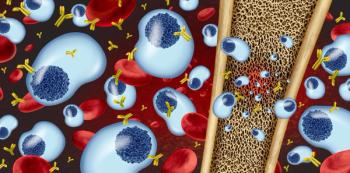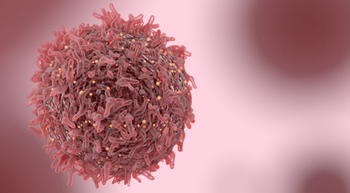
Additional exploration may help fully realize the impact of combining immunologic approaches with PARP inhibition, says one expert.

Additional exploration may help fully realize the impact of combining immunologic approaches with PARP inhibition, says one expert.

Initial therapy with isatuximab plus VRd followed by its addition to Rd maintenance therapy led to significantly improved MRD negativity and PFS in transplant-ineligible multiple myeloma.

APPs provide an in-depth look at amivantamab plus lazertinib for the treatment of patients with locally advanced or metastatic non–small cell lung cancer.

Understanding psychosocial implications, barriers, risks, and impacts.

FDA gives nod of approval to first derived mesenchymal stromal cell therapy for the treatment of pediatric patients with steroid-refractory acute GVHD.

Ensartinib has received FDA approval for the first-line treatment of ALK-positive locally advanced or metastatic non–small cell lung cancer.

Pharmacologic strategies may be able to prevent abnormal uterine bleeding in patients undergoing stem cell transplant.

The combination treatment of elacestrant and abemaciclib provided clinical benefit with acceptable safety in patients with ER-positive, HER2-negative advanced or metastatic breast cancer.

Treatment with zanubrutinib, compared with bendamustine plus rituximab, reduced the risk for disease progression or death by 71% in patients with CLL/SLL, according to 5-year follow-up.

The role of circulating tumor DNA is growing: From detecting early disease to guiding treatment plans, clinicians are finding ctDNA testing increasingly important.

Nurses play an important role in the administration of biosimilars and the education of patients receiving them.

Baseline ctDNA presence was associated with larger tumor size and higher residual disease burden scores following neoadjuvant endocrine therapy in HR-positive, early breast cancer.

This past year, the role of ctDNA testing has expanded to guide treatment decisions for providers and patients with cancer.

Treatment with venetoclax plus hypomethylating agents yielded improved response rates among adult patients with myelodysplastic syndrome.

Perioperative atezolizumab did not improve outcomes in patients with triple-negative breast cancer.

Following risk management measures, ponatinib-associated adverse events in CML and ALL were shown to have decreased significantly since the drug’s approval.

A phase 1 trial of camizestrant with ribociclib appears safe and effective in patients with ER+/HER2- advanced breast cancer.

Patients administered lymphodepletion prior to brexu-cel in the outpatient setting experienced a 60-day non-relapse mortality rate of 3.6% in B-ALL and MCL.

According to real-world data, no survival advantage was seen when comparing 3 frontline CDK4/6 inhibitor combinations in HR-positive, HER2-negative metastatic breast cancer.

“This benefit in local recurrence translates into a later difference in distant recurrence and breast cancer [mortality], but it’s only apparent with long follow-up,” according to the study author.

An FDA approval was granted for cosibelimab-ipdl for the treatment of patients with locally advanced or metastatic cutaneous squamous cell carcinoma.

Neoadjuvant camrelizumab paired with chemotherapy could represent a new option in early or locally advanced triple-negative breast cancer.

Palbociclib plus anti-HER2 therapy and endocrine therapy improved progression-free survival in the first-line maintenance of palbociclib in HR-positive, HER2-positive metastatic breast cancer.

The combination of selinexor with ruxolitinib, in both 40mg and 60mg doses, demonstrated encouraging efficacy with a manageable safety profile in patients with myelofibrosis.

High-grade immune-related adverse effects occurred in 18.9% of older patients with early-stage breast cancer treated with immune checkpoint inhibitors, according to a multi-institutional study.

Adjuvant olaparib continued to show a strong efficacy benefit in patients with BRCA1/2 mutation–positive, HER2-negative high-risk breast, according to 6-year data from the OlympiA trial.

Neoadjuvant patritumab deruxtecan demonstrated comparable responses with lower high-grade adverse effects in patients with high-risk, HR–positive, HER2-negative breast cancer.

Treatment with pirtobrutinib induced superior progression-free survival among heavily pretreated patients with relapsed or refractory CLL/SS previously treated with a covalent BTK inhibitor.

Updated data from the DREAMM-7 trial support the use of belantamab mafodotin plus bortezomib/dexamethasone as a potential new standard of care in relapsed or refractory multiple myeloma, according to Vania Hungria, MD, PhD.

Imlunestrant, alone or in combination, may provide an all-oral, targeted therapy option following progression for patients with ESR1-mutant, ER-positive, HER2-negative advanced breast cancer.